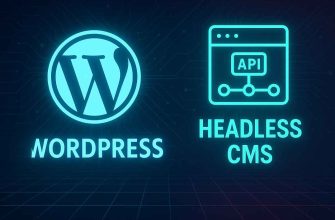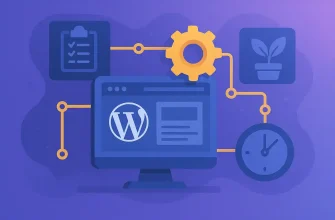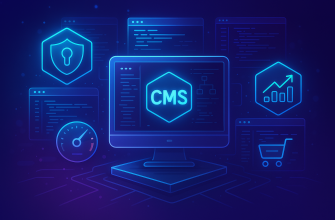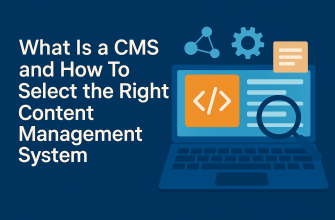As trends in WordPress evolve, the platform continues to shape the future of web development, offering intelligent automation, better security, and seamless user experiences. In 2025, website personalization through AI, no-code design tools, headless WordPress, and voice search optimization will simplify site management and boost efficiency. Staying current with these trends means enhanced performance, improved SEO, and a more interactive user experience. Whether you’re a developer, blogger, or business owner, staying updated with the latest trends is essential.
Top WordPress Trends in 2025
1. AI-Powered Websites
AI-driven plugins and themes will enable even those with little development experience to easily build websites, content, and images—no coding required. AI tools that assist with website creation by simply adding a prompt are expected to become more popular. These tools speed up website development and increase accessibility, allowing users to deploy professional websites effortlessly. Developers will distinguish themselves in 2025 by utilizing AI for advanced tasks such as predictive user journey mapping, generative content, and adaptive chatbots.
How Developers Use AI for User Journey Mapping
AI tools can track user interactions like clicks, page views, and time spent on each page. By analyzing this data, developers can pinpoint friction points and predict future user behavior. These insights help improve content, navigation, and calls to action, guiding users toward conversions. Additionally, combining AI with edge computing and content delivery networks improves website responsiveness and speed, ensuring smooth, real-time interactions.
2. Voice Assistants
Voice assistants like Siri and Alexa are becoming increasingly popular for their speed, particularly on mobile devices. With voice search, users can check invoice statuses or track orders. WordPress plugins like Yoast SEO and Schema Pro organize content using structured data (schema markup), making it easier for voice assistants to process and read aloud. Google’s Speakable specification also highlights content optimized for voice search.
3. Full Site Editing – Block Themes
WordPress now allows you to edit every section of your site—header, footer, sidebar, and more—using drag-and-drop elements. The latest default theme, Twenty Twenty-Five, offers a lightweight and flexible design tool with pre-built block patterns, enabling users to create stunning layouts with just a few clicks.
4. Minimalist WordPress Design
Minimalist design is a significant trend in 2025, emphasizing clean layouts, white space, and a focus on content. Lighter pages with fewer images load faster, improving user experience and boosting conversions. WordPress offers flexible and customizable minimalist themes like Astra, Neve, and OceanWP.
Benefits of Minimalist Design
- Better User Experience: Simple layouts make navigation easier and content more readable.
- More Engagement: Fewer distractions keep visitors engaged longer.
- Mobile-friendly: Minimalist designs adapt seamlessly to various devices.
- Easy Customization: Many minimalist themes allow easy tweaks to match your brand.
5. AR/VR in WordPress
Virtual Reality (VR) and Augmented Reality (AR) are revolutionizing user interaction. AR lets users visualize products in their own space, while VR offers immersive experiences, ideal for virtual tours or educational purposes. Plugins like CartMagician PRO AR and iPanorama 360 enhance e-commerce and virtual tours. WebAssembly is also gaining traction, helping run non-JavaScript code in the browser, which boosts website speed and enables new, advanced plugins.
6. Multilingual Support
Multilingual support is crucial for reaching a global audience. WordPress offers plugins like WPML and Polylang, which let you add multiple languages to your site. You can also use WordPress Multisite for managing separate sites in different languages, expanding your reach and improving user experience.
7. Headless WordPress
Headless WordPress enables developers to separate the front end and back end, using tools like React or Vue.js for dynamic, platform-independent front-end design. This approach offers flexibility and improved performance across devices, using technologies like GraphQL or the WordPress REST API.
8. Dynamic Content for Personalization
Dynamic content adapts to users based on their location, time, device, or browsing history. Plugins like If-So and PersonalizeWP enable tailored experiences that increase engagement and conversions. This personalization helps businesses show relevant content and offers to different audiences, improving user experience and boosting revenue.
How Dynamic Content Personalization Works
- Set conditions based on triggers like location or device.
- Create alternative content versions for each condition.
- Use shortcodes to insert personalized content into posts, pages, or widgets.
- Show targeted offers and messages to improve engagement.
9. WordPress Accessibility
Accessibility is a growing trend in 2025. Ensuring that websites are usable by everyone—including people with disabilities—is essential. WordPress plugins like WP Accessibility and AccessiBE help fix common accessibility issues, and WordPress 6.4 introduces features that enhance accessibility in the site editor and admin panel.
10. Integration with Emerging Technologies
Blockchain technology is becoming increasingly important for secure payments. Plugins like Helio Pay and Coinbase Commerce allow WooCommerce stores to accept cryptocurrencies, ensuring safer transactions without third-party fees.
11. Progressive Web Apps (PWA)
PWAs enable WordPress websites to function like mobile apps. With PWA support, websites load quickly on slow networks, provide offline access, and support push notifications, enhancing user engagement and experience.
Conclusion
WordPress provides powerful tools for creating and customizing websites. In 2025, headless WordPress enhances speed, dynamic content personalization connects businesses with global audiences, and accessibility ensures inclusivity, driving traffic and conversions. To maximize success, choose managed WordPress hosting to handle the technical aspects, allowing you to focus on your business while scaling effortlessly.
Frequently Asked Questions
1. What is the future of WordPress in 2025?
WordPress will continue to dominate with trends like AI-powered sites, headless solutions, enhanced accessibility, and dynamic content personalization.
2. Why is accessibility important in WordPress?
With growing web accessibility regulations, WordPress is focusing on making sites more inclusive for users with disabilities, ensuring a better user experience and improved SEO.
3. Are no-code and low-code solutions becoming more popular in WordPress?
Yes, WordPress now offers drag-and-drop builders, automation plugins, and AI-assisted tools that enable non-developers to create stunning websites.









